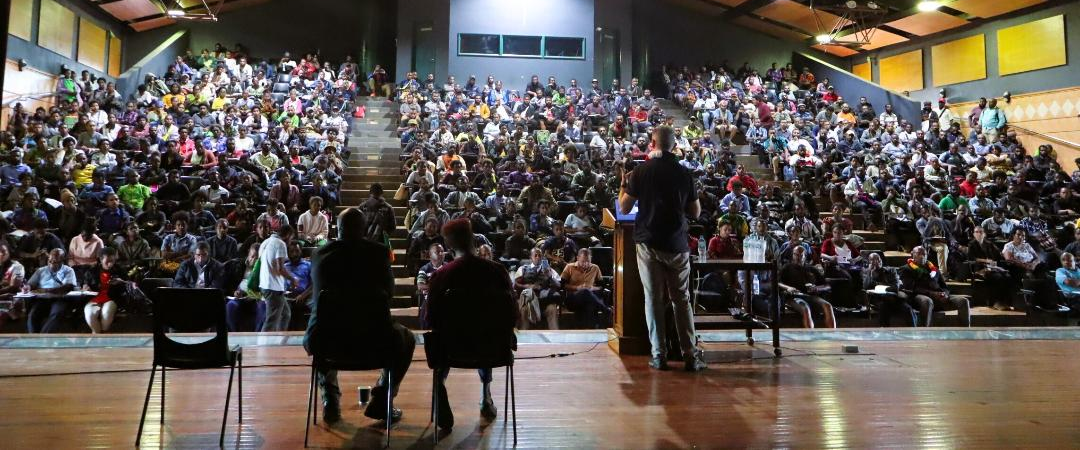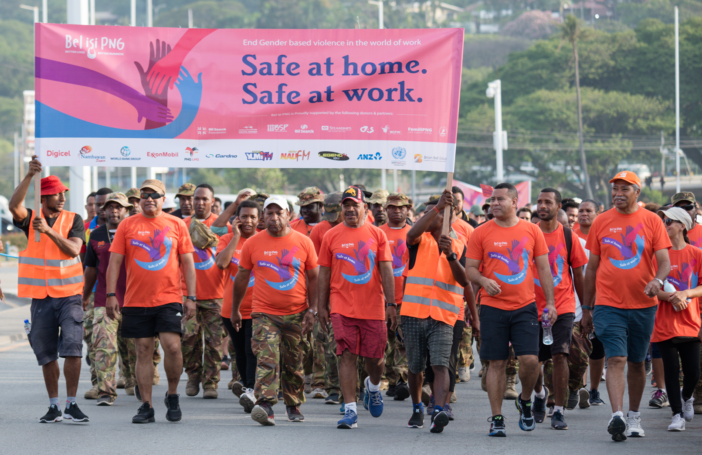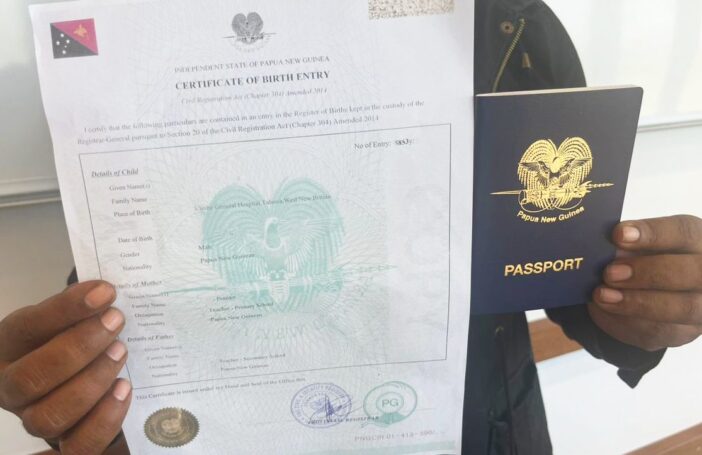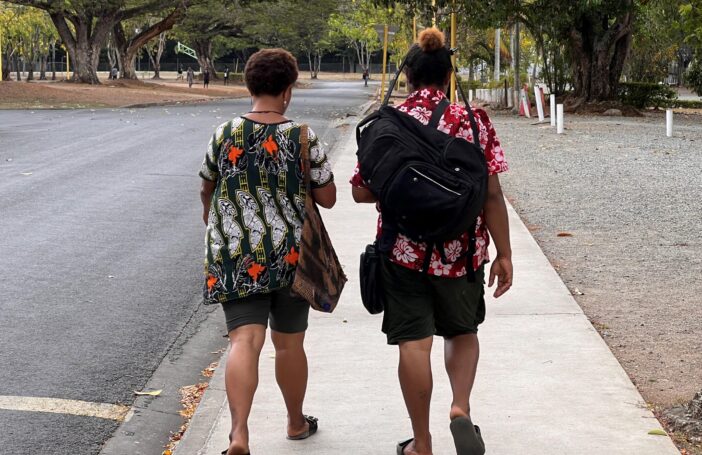I had the privilege of returning to Papua New Guinea in March to speak to university students, officials, researchers and other interested parties about the findings from my PhD research completed at the Australian National University in 2023, Statecraft and Pushback: Delivering China’s grand strategy in Melanesia 2014-2022. Over the course of 10 days, I spoke to over 1,500 people at the University of PNG (UPNG) the University of Goroka (UOG), the University of Technology (UniTech) in Lae, Divine Word University (DWU) in Madang and the National Research Institute (NRI) in Port Moresby.
I invited each audience to interrupt me and ask questions at any time, which they did — their questions were excellent and broad-minded. Such “Q&A on the move” allows the audience to shape the delivery in ways that meet their curiosity and interests, and demonstrates respect for their contribution. I enjoyed their critical thinking as they explored my research, and some connected matters. Importantly, the visit also allowed me to catch up with old friends who had shaped my understanding through an ongoing conversation spanning several years. This piece provides a brief description of the research findings I presented during the visit while emphasising that I continue to learn from the interactions I have with people in the Pacific.
The research explored Chinese and Pacific perspectives through 297 conversations across PNG, Solomon Islands, Vanuatu, Fiji, Timor-Leste and China over a period of nine years. Those interactions were with senior officials, politicians and academics in both China and the Pacific. I spoke to Chinese state-owned enterprise (SEO) executives, managers and workers, along with villagers and locals at the “grassroots” in those Pacific countries. Importantly, this included the Chinese diaspora on the ground, ranging from the “Old Chinese” to the “New Chinese”.
Existing research identified three “waves” of Chinese economic migrants, who pursue private interests. The “first wave” Chinese economic migrants from Fujian and Guangdong have been part of the population in Pacific Island countries, like Papua New Guinea, for five or six generations and are largely involved in retail and wholesale.
A “second wave” migrated to Southeast Asia after the Second World War and then moved to the Pacific during the 1970s and 80s, many of whom are involved in the PNG and Solomon Islands logging industries. The “third wave” commenced at the turn of the century in much larger numbers which continue to dominate retail sectors throughout the Pacific. I added to this list a growing “fourth wave” of people employed by the People’s Republic of China (PRC) — both officials and SOE employees — who, unlike the first three waves, pursue the interests of the state.
This broad set of discussions enabled a unique analysis of how PRC statecraft operated and how Pacific Islanders responded to it, as the Belt and Road Initiative (BRI) delivered China’s grand strategy. The BRI arrived in PNG and then was connected to the broader Pacific following the 2018 Asia-Pacific Economic Cooperation (APEC) meetings held in Port Moresby. As a PNG observer of these events pointed out in one of my audiences, in 2015 China’s President Xi Jinping had personally committed to attending the 2018 APEC Leaders’ Summit and therefore the geopolitical engagement of the Pacific by China in 2018 was no accident. Nevertheless, there had been no clear evidence of this interest at the inception of “One Belt One Road” in 2013.
The research analysed change in the resourcing of the PRC’s grand strategy across the five case studies from 2017, through the framework of political, economic and security statecraft. Statecraft is the goal-oriented employment of an instrument of state power (political, economic or security) to generate influence by one country over another. Grand strategy is the comprehensive employment of statecraft to achieve long-term national objectives by any country (regardless of its size).
In the political dimension, China enhanced its influence across Melanesia by demonstrably improving the quality of its ambassadors posted to the region from 2017, and then further resourcing its propaganda and united front work. Notable among these ambassadors were Xue Bing (PRC Ambassador to PNG 2017-2021) and Qian Bo (PRC Ambassador to Fiji 2017-2022) who were the first Chinese Ambassadors promoted from roles in Pacific nations to become regional envoys. The PRC’s Ministry of Foreign Affairs appears to have maintained this priority since then. The majority of ambassadors now come to these posts having served in the important role of Deputy Director General of a Division in the MFA, an indicator of capability that draws on a much smaller pool of foreign service officers than the much larger global pool of PRC Ambassadors.
In the economic dimension, under BRI, Chinese SOEs saturated Melanesian construction sectors (for PNG this was an increase in the number of PRC SOEs by 100% in one year) and dominated the tendering process for projects funded by multilateral development banks (MDBs) in the Pacific, such as the Asian Development Bank (ADB) and the World Bank. In 2019, more than 80% of the ADB’s infrastructure projects in PNG were delivered by PRC SOEs. Such companies secure geopolitical influence and geostrategic access for China in the Pacific, often using money from other countries. PRC SOEs bid for MDB tenders at such low prices that no other company can compete with them (including those belonging to the host country). They are providing cheap infrastructure for a developing nation that needs it, but their methods can generate undesirable consequences.
As for the security dimension, the PRC enhanced its security statecraft with the arrival of People’s Liberation Army defence attaches in 2020, Ministry of Public Security (MPS) police liaison officers from 2021, and then police training teams (Solomon Islands 2022, Vanuatu and Kiribati 2023). There had previously been a lengthy relationship between China’s MPS and the Fiji Police Force (FPF) between 2011 and 2022, which had involved the periodic embedding of MPS detectives within the FPF. The embedding of PRC police detachments in local police forces can affect the rule of law and influence decision-making. There have been several examples of extraditions from such countries by Chinese police without an extradition treaty being in place, using “joint” operations that did not appear to involve the local force.
The PRC’s representatives in Melanesia integrate these three strands of Chinese statecraft to complement each other’s effects and adapt them to conditions on the ground. They deliver PRC grand strategy in the Pacific Islands to enhance China’s geopolitical influence, expand its geostrategic access and accumulate resources.
The discussion of this context hopefully added clarity to some key issues which are increasingly affecting Papua New Guineans. This series of presentations sought to reciprocate the support, kindness and knowledge that their people invested in me during the nine-year journey of my research. It forms part of a continuing conversation.
Connecting to and working with people in the Pacific Islands is essential to meaningful research in the region. It is equally important that researchers share the findings of their work with people and communities who shared knowledge with them along the way. This sharing of information can be described as an ethical obligation — having gained access to the insights of Pacific Islanders (not to mention their generous hospitality and their time), there is a reasonable expectation that you will return to “give back” by sharing your analysis and findings with people who are interested in it. This act of reciprocation is a core value of Melanesian Kastom and Pacific culture.
I would like to thank UPNG, UOG, UniTech, DWU, and NRI for their kind invitations and their hospitality. I am particularly grateful to the Papua New Guineans that attended these events for their generosity, excellent questions and critical thinking.
Tenkyu lo yupla toktok wantaim mi.
Tenkyu tru Papua New Guinea!




